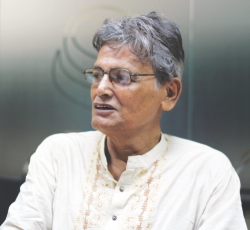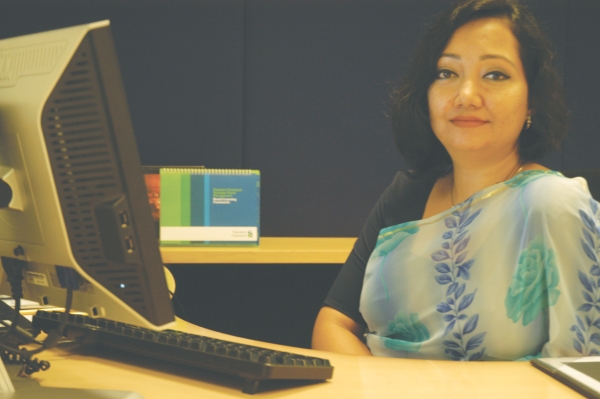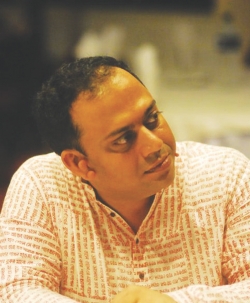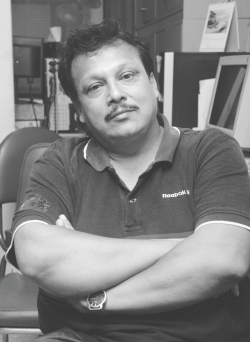| Interview
Anup Bhattacharya still escapes to the
world of music
Anup Bhattacharya, a veteran lyricist has decades of experience in classical Bangla songs. His journey into music started with singing the immortal songs of Tagore. He, being engulfed into the art, is well versed in folk songs and the great works of Lalon. He is now retired, but still composes music every now and then to escape to the world of music.
..............................................................................................
 |
Anup Bhattacharya |
Anup Bhattacharya has been on the jury panel for Celebrating Life's Lyrics Competition for the past two years. He says that he is contributing his time into this ordeal through a heightened sense of responsibility, and he has taken it up as a challenge to fish out the cream of the crop from the thousands of lyrics that are sent to the competition every year.
The veteran lyricist says, “I personally feel that the entries last year were comparatively better in quality than the ones we went through this year. The important point that arises is that, out of the thousands of entries this year; only a few were emerged as 'pearls from the depths of the ocean'. This had brought much joy to me.” Bhattacharya thanked The Daily Star for providing him with this opportunity.
He went on saying, that there were the few others who showed great potential in their works. His comments were, “They can be made to realize their potential to reach a new height with proper training. The Daily Star should take up an initiative to train them to turn them into gems and assets for the nation. There are a few conditions that need to be fulfilled to become an aspiring lyricist. A song has to be a poem! It has to have a tune; a rythm; a beat. Without these elements portrayed within the wordplay… the composition cannot be called a song. The predefined conditions that the writer needs to grasp are the Shorothbritto, Matrabritto and Akkharbritto. The great ones such as Tagore and Nazrul all had a strong grasp on these basics, and thus were able to become immortal through their works. And lastly, after mastering the three attributes, they have to master the Antomil. It is all well and good to make words rhyme after each line, but they have to be related; they have to make sense together; one cannot just get away by rhyming bhera (lamb) with ghora (horse). There has to be consistency and coherence as to what the writer wants to say through his lyrics.”
Anup Bhattacharya was very passionate when he referred to the art of song writing. He says, “It's not just that people writing will just come and go. They have to leave a mark. It is necessary for the growth of the occupation in a whole to set standards for others to pick up and use as reference.”
“In three years Celebrating Life has grown,
but this is only the beginning”
Bitopi Das Chowdhury
Bitopi Das Chowdhury is the Head of Corporate Affairs at Standard Chartered Bank, Bangladesh. Hasan Ameen Salahuddin caught up with her to pen down her thought on Celebrating Life and its future.

Bitopi Das Chowdhury
Hasan Ameen Salahuddin (HAS): Celebrating Life, co-organized by The Daily Star and Standard Chartered Bank, was initially founded on a three-year agreement. What are your thoughts on the sustained relationship between the two organizations after three years?
Bitopi Das Chowdhury (BDC): Standard Chartered Bank and The Daily Star embarked upon this partnership for Celebrating Life Contest in 2008. This year, we are very happy to renew the partnership for another 3 years. It has been a rewarding and fruitful relationship, and we are proud of the platform that this contest is providing to the budding creative minds.
HAS: Could you please share some of the feedback received from your organization on the Celebrating Life Competition?
BDC: As this is our event, staff at Standard Chartered naturally feels very close to the competition. They promote the competition among their family, friends and social circles; they feel that such a high-profile competition motivates the people of Bangladesh to experiment with their creative talents. We would all like to see Celebrating Life reaching many more people at all corners of the country, and bringing in people at the same platform irrespective of their social, economic or educational backgrounds.
HAS: What are your clients' feedbacks on the Celebrating Life Competition?
BDC: In general, we get a lot of appreciation and encouragement for being the sponsors of this unique competition from all our stakeholders.
HAS: Being the sponsor, where do you see the Celebrating Life Competition five years into the future?
BDC: I am hopeful that 'Celebrating Life Awards' will grow to be a distinguished and sought-after recognition for the people of Bangladesh. In the future, I would like to think of this competition as having provided the awardees an important 'stepping stone' to their successful careers. And this award should be a household name, not only in the major cities or metropolitan areas, but also in the remote villages of our beloved Bangladesh where nature and mankind still co-exist in harmony. Moreover, the competition should not be limited to being an award only; it should also be an avenue to expose participants to acclaimed works in the fields of lyrics, film and photography. That is why we are bringing in new additions to the competition, like the 'film-making workshop' this year. Hopefully, our endeavours in the coming years will help the participants of Celebrating Life refine and better their work, and present something truly beautiful to the world.
HAS: How would you describe the progress of Celebrating Life over the years?
BDC: The last three years have been a wonderful journey for Celebrating Life. The response from participants has been overwhelming, and it has been growing every year. We are also thankful to various people and institutions for their continuous support and encouragement towards this competition. Firstly, I'd like to express my heartfelt gratitude to the Honorable President of the People's Republic of Bangladesh for his kind patronage and personal interest in this competition. I must thank the honourable Jurors, who are eminent personalities in their respective fields, and find time out of their very busy schedules to review the entries. And of course, I must thank all guests at the Award Giving Ceremonies and the District Festivals, whose presence makes all our hard work worthwhile. And there are many more to whom we owe the success of Celebrating Life. We hope the award will continue to grow with their continued support in coming years.
HAS: If there was one single thing that you would change to make the experience better for both the contestants and Jurors, what would it be?
BDC: One marked improvement can be brought in by the use of technology for submitting entries. At present, majority of the entries are sent by post and are mostly hand-written (in case of lyrics). If the entries are sent via email, it will be better for the contestants because they can immediately get an acknowledgement that their entries have reached the organizers. For the Jurors, the typed format will save a lot of time in reviewing the entries. Another important improvement that the contestants can bring about is to ensure that they adhere to the given theme/subject of the contest; that way the contestants will not be disappointed when their entries are not considered for the competition.
HAS: What would you say about the achievements by Celebrating Life made on a whole?
BDC: Overall, in this short span of only three years Celebrating Life has grown, but this is only the beginning. I'd like to see this competition be one of the major forces in the cultural scene of Bangladesh. And for that to happen, we need all our friends and partners to let us know how we have done so far, and what more can be done. I believe, together, all of us can make Celebrating Life truly make a difference.
“My experience has been amazing because of the entries growing in numbers each year” -
Gitanka D Datta
Gitanka D Datta is the Head of Cards, Standard Chartered Bank, and has been affiliated with the Celebrating Life Competition since its inception in 2008.
 |
Gitanka D Datta |
Hassan Ameen Salahuddin (HAS): How would you describe your experience as a jury panel member of the Celebrating Life Competition for the past four years?
Gitanka D Datta (GDD): It has been an amazing experience, to be honest. I have been associated with the competition since its inception, and have been on the jury panel for the photography section save one of the years in the past four. The experience has been amazing because of all the young participants and the entries growing in numbers each year. It has been truly exciting to see them express their creativity through capturing still moments and trying to portray each unique theme presented to them every year.
HAS: How would you describe Standard Chartered Bank's feedback given the last few years of Celebrating Life? What would the bank's suggestions be to better the overall experience?
GDD: Primarily, the Standard Chartered Bank and The Daily Star started off with this whole initiative because there were quite a few other setups recognizing different other fields within arts and crafts, but there were actually no structured programs to recognize amateur photographers of the country. We felt that we could step up and do something about it and create a platform where their work could be showcased, and provide them with much more recognition in the process. Standard Chartered is the oldest bank in Bangladesh, and as such we feel very much a part of the history and heritage of this great country. As a leading corporation, this is one of the many ways we strive to give back to the community, by showcasing the creative talents of the youth of Bangladesh in the fields of photography, lyrics and filmmaking.
HAS: What are the general feedbacks of clients of the bank in regards to Celebrating Life?
GDD: A lot of our clients are invited to attend the events of Celebrating Life and are very appreciative of the initiative. Many of them say that this is a much-needed initiative, and everybody hopes that more organizations would take up similar initiatives to showcase and nurture the talents of the country.
HAS: What potentials do you think the successful contestants have in terms of joining the mainstream media scene?
GDD: Many of the participants are amateurs, and they may not pursue photography other than it being a hobby; and there are some who are very serious and are very keen to pursue this as a full-time career. Either ways, the country ultimately is a beneficiary of their efforts. Just for example, the jury panel includes a full time oncologist; another is a leading architect, while only one of them was a photographer by profession. But even then, the others are also considered to be leading photographers in the Bangladesh. Thus, irrespective of whether these participants want to pursue the trade as their profession or not, they can definitely benefit the country if they are serious with it and keep producing creative work.
HAS: How would you describe the progress of Celebrating Life over the years, and where do you see it heading towards in terms of success in the near future?
GDD: I think Celebrating Life has matured quite well. To enrich the contest, every year we are trying to incorporate more attributes within the scope of the competition. For example, the lifetime achievement awards were introduced last year while the film making workshop has been introduced this year only. The participation in the competition is growing every year, which in itself shows the growing popularity of the contest. The stature of this award, the standard of work that is recognized through this award all point to the success it is gathering and in turn to its future sustainability.
There is also room for improvement. We could further increase the scale of the contest through increasing awareness of the whole event; maybe one way to achieve this can be by holding the district tours outside of the metros on a grander scale, making it truly the national event that it was meant to me.
“Photographs need to tell a story” - Shafiqul Alam Kiron
Shafiqul Alam Kiron is a professional photographer since 1993. His journey in the field began in 1991 as amateur, and then with five others in 1993, he opened up the commercial photography firm: Map Photo Agency. He has been working with the firm ever since, and specializes mainly in Documentary type photography. Examples of his work include collaborations with international NGOs such as UNICEF and Save the Children on projects dealing with acid victims and old age homes in the country.
 |
Shafiqul Alam Kiron |
On asking Shafiqul Alam Kiron - one of the four jurors of the Celebrating Life 2011 Photography Competition - about the quality of work entered into the contest this year, he was very prompt in saying that the quality was definitely much better in content this time around compared to last year. Kiron said, "The contestants this time around were much more aware of what they were doing in terms of the theme and the application of their skill came more naturally. The contents were rich in quality, and each picture had a story to tell. If you look on an international level, the competitions and exhibitions there are concerned with abstract story telling with organizing photographs in order so that they end up telling a story through pictorial descriptions. We have, through the judging process this time around, seen such potential in the material entered in the competition, which was evidently not visible last year."
Being on the Jury Panel for two years in a row, Kiron has expressed his feeling on the Celebrating Life Competition to be a good platform for amateur and upcoming artists in the field. "Over the years there have been very many competitions and exhibitions all over. These competitions along with the Celebrating Life Contest have grown with time. People used to send in photographs they took with amateur cameras or even their mobile-phones, whereas the same people are now more serious with their works. These competitions have given them a scope to better their skills in the field and be more passionate about their entries", he said.
When asked to compare the works of the entries with that of acclaimed photography schools in the country, Kiron said that it was very hard to compare photographs in general. "Of course quality can be compared, but that too is dependent much to an extent of what type of equipment is used. Definitely a picture captured with a professional tool will be better than that which is captured by a camera on a point and click type camera. But, on the other hand, the content captured in the picture by an ordinary camera can exceed the quality in terms of substance captured by the professional camera. It all depends on how good an eye you have for details. The works submitted in another sense are different and cannot be compared with the works of students in these acclaimed institutions. For instance, the competition has always constricted the entries to a set theme, whereas the pictures taken by students in the institutions are not based on the same theme. It is thus that the options of comparing these works with one another do not arise."
Kiron, being asked as to whether the emerging winners of the competition have the potential to enter international competitions and win prizes in them, said, "Definitely. But, most contestants here are amateurs as of yet and students in the field from various institutions around the country. It would not be a very bad idea if they attended workshops of various kinds, and enrolled in professional photography courses to enhance their skills with the camera first."
He commended the efforts of The Daily Star and Standard Chartered Bank in collaboration to have introduced the Film Making Workshop this year, and expressed that such a workshop in photography would also go a long way. He even showed enthusiasm towards conducting such an event, but only if it was just small parts of it and if it did not clash with his busy schedule. Kiron advises the contestants not to be disheartened if they don't see their names amongst the winners. "It's not a matter of not being eligible to win, but it's actually because of the marking procedure. Most of the time it is seen that a picture wins a prize by beating another picture by marginal marks scored. The competitors must always keep in mind that they are not the only ones submitting works, and that there is always the bigger chance that someone else will submit something better. They have to always keep in mind that the subject, theme, composition, and color are cohesive and are as perfect as they can be portrayed."
All Interviews by Hasan Ameen Salahuddin
Copyright
(R) thedailystar.net 2011
|




